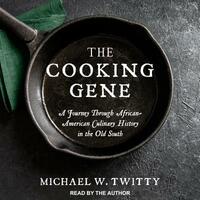You need to sign in or sign up before continuing.
Take a photo of a barcode or cover
537 reviews for:
The Cooking Gene: A Journey Through African-American Culinary History in the Old South
Michael W. Twitty
537 reviews for:
The Cooking Gene: A Journey Through African-American Culinary History in the Old South
Michael W. Twitty
This book took me a long time to read. Much longer than it should have, but I would read something, and then think on it for some time. Much of what I thought I knew about history was really, very superficial, and this book made me realize just what I had learned in school, and how much more there was to the history behind just about everything, but especially the slave trade.
This book is one that's hard to categorize. While the title tells you that the book is going to trace the roots of the stereotypical Southern (American) cuisine, there's also a lot about the author's genealogy (as well as the problems regarding genealogy for African-Americans), there's lessons in what life was like for a slave - and while not gory in details, the frankness is almost as unnerving, but in a good way.
There's little bits of information that made me realize connections to other things, as well as uncovering the basis for some stereotypes.
This book covers a lot, and does so well. I think I'm going to need a few days to fully understand what all I just finished.
I should note that you should probably have some snacks on hand as you read this. All the talk about the different foods, and the evolution of the cooking, and ... well, I found myself craving a snack as I read.
A number of recipes appear in the book, and I'm a sucker for recipes in books, especially this sort, where you can make what he talks about.
If you like a book that talks history, cooking, genealogy, and living history reenactment, this is a good book for you.
This book is one that's hard to categorize. While the title tells you that the book is going to trace the roots of the stereotypical Southern (American) cuisine, there's also a lot about the author's genealogy (as well as the problems regarding genealogy for African-Americans), there's lessons in what life was like for a slave - and while not gory in details, the frankness is almost as unnerving, but in a good way.
There's little bits of information that made me realize connections to other things, as well as uncovering the basis for some stereotypes.
This book covers a lot, and does so well. I think I'm going to need a few days to fully understand what all I just finished.
I should note that you should probably have some snacks on hand as you read this. All the talk about the different foods, and the evolution of the cooking, and ... well, I found myself craving a snack as I read.
A number of recipes appear in the book, and I'm a sucker for recipes in books, especially this sort, where you can make what he talks about.
If you like a book that talks history, cooking, genealogy, and living history reenactment, this is a good book for you.
Tremendous document of foodways and folkways (and also new and upsetting way to explore the massive fucking horror and embarrassment of America's slave society).
I really enjoyed the blend of food, history, culture, and personal stories of the author! Can't wait to cook some of the recipes included in the book!
This book was overall fascinating, if a bit dry at points. It provided a new perspective on the history and experience of Blacks in the US by examining the culinary history of Southern food.
At first I was a little disappointed this book didn’t fit what I thought it would be—a more linear history of Soul/Southern food traced through the roots of slavery. It’s a little bit of that, but it reminds me more of another favorite of mine—On The Road. Both center on a man traveling to discover their personal American Story, and telling that story in a beautifully written steam of consciousness. In this instance a history and culture that has been suppressed for hundreds of years through horrific violence, and its impact on the author’s identity, is reclaimed. It importantly reinforces the idea that the biggest influence on Southern Cuisine was the cooking of enslaved Africans and their descendants. It also contextualizes Soul/Southern food through the lens of violent oppression versus the fight to survive and retain humanity and culture. From an outsider’s view it seems to serve as a manifesto for African Americans to be empowered to tell their own stories and make speaking directly to their communities the priority—and only incidentally to those in privilege such as myself. As a Southerner and an American I know these experiences and contributions of a people whose stories, cultures, and bodies have been historically suppressed/oppressed, is a vital and important history to tell.
It was a really interesting subject matter, and I learned a lot from it, but there was so much unnecessary detail at certain points in the book that it felt like a chore to read it. It took me months to get through it (kept setting it aside and reading other books), but I finally finished once I checked out a copy of the audiobook! If you’re thinking of reading this, I would recommend the audiobook version, which is read by the author.
The best of Southern and good history
An essential read for anyone like me, heavily interested in both southern and food history, and racial history in the South. It spoke to me as a white native South Georgian, descended from sharecroppers, like few other books have. And Gritty is a fantastic writer. I can't wait to see him in person sometime.
An essential read for anyone like me, heavily interested in both southern and food history, and racial history in the South. It spoke to me as a white native South Georgian, descended from sharecroppers, like few other books have. And Gritty is a fantastic writer. I can't wait to see him in person sometime.
This is my first time reading “culinary history” - I love how Twitty uses food as a doorway into broader African American (and all that encompasses) history. His exploration of his own family stories and genealogy is a beautiful example of how the particular is universal.
A SOLID 3.5 - fascinating journey, marred only by some repetitiveness.
informative
There is a lot of really interesting information in this book, unfortunately I feel like it tried to be too many things at once - a personal memoir, a genealogical tracing, a study of food history, and an examination of the development of African-American culture - and as a result the narrative jumped around a lot in a way that I found difficult to follow, particularly in the audio format. I think it might have been easier with pages where I could flip back and cross-reference, but as it was I spent a lot of time trying to remember if a story about a grandmother or a great-grandmother was someone we had met before and if so, in what context. Still, I did like see the different factors that went into foods we think of a typically “Southern” as well as some we don’t but probably should. I found particularly interesting the tracing of rice’s path from the far east through Africa and to the colonies. Having recently been to Madagascar and seen how they relate to rice gave me a different appreciation for that chapter.






